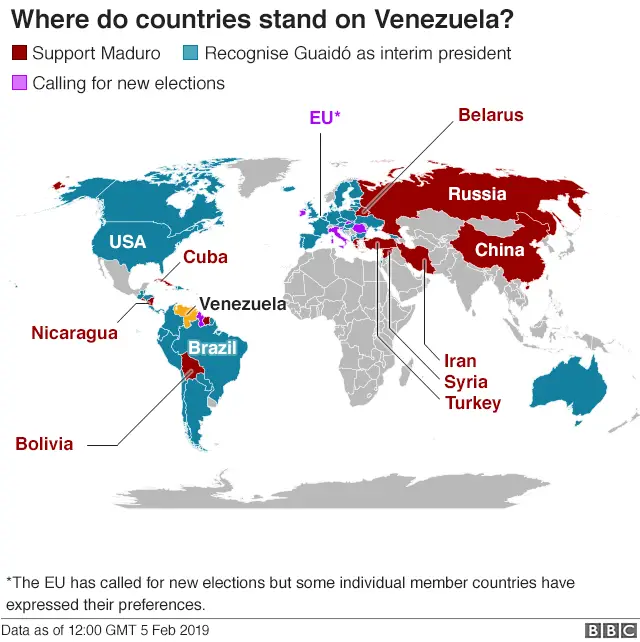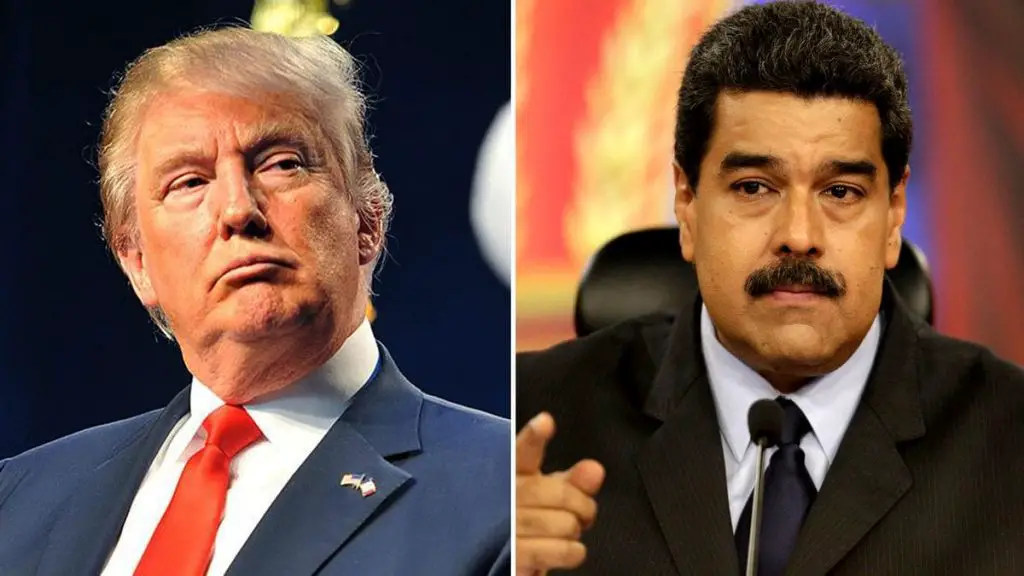Venezuela’s economy seems to be in free-fall. That’s relevant here because it is likely to become a presidential campaign issue. The country that sits on the largest oil reserves in the world is now importing oil to meet its needs. Inflation is so high it can’t be accurately calculated. (Their money is basically worthless.) There are shortages of food and medicine that have led to an average weight loss of 24 pounds per resident. We keep hearing, every day, in the media about Venezuelan opposition politician, Juan Guaido, but President Nicolas Maduro continues to hold power. Why is that?
First and foremost, Maduro stays in power because of the Venezuelan military backs him up.
When Mr. Maduro’s predecessor, Hugo Chávez, came to power he purged the military to ensure its senior figures were aligned with his left-wing ideals, analysts say. . .
“Previously the military had been more or less confined to barracks, but Chávez let them out and gave them access to cabinet posts, to control of banks and other financial services,” Phil Gunson, senior analyst at the International Crisis Group, a Brussels-based think tank, told the BBC. . .
Key sectors now in the hands of senior officers include the crucial food distribution services, run by Defence Minister Vladimir Padrino, and the state-owned oil and gas company PDVSA, which has Maj Gen Manuel Quevedo, head of the national guard, as its president.
So the military doesn’t want to bite the hand that feeds it. They are actually part of the government that is being attacked. The rebel Guaido has tried to win the military’s favor by offering amnesty but they would be stripped of their power and wealth, so they are betting on Maduro’s staying in power—and their being allowed to keep their jobs.
But it’s not just the military. As part of Hugo Chavez’s efforts to reduce poverty and inequality, the previous president had set up collectives (militias) within communities.
The colectivos emerged during Chávez’s years and, with government backing, spread across communities as social organisations supporting the implementation of official aid programmes. They are believed to have a few thousand members all around the country. . .
As discontent with Mr Maduro grows, fuelled by an economy in freefall and widespread shortages of food and medicine, some fear things could turn even more violent with the armed colectivos, working alongside security forces loyal to the president, playing a key role in the streets.
Therefore, any intervention by a foreign power could risk a civil war that would lead to extreme bloodshed. Maduro warns Donald Trump that if he invades Venezuela, he might be stepping into a quagmire like Vietnam, which would also cost many American lives.
Earlier this week, Mr. Maduro said he could not rule out the possibility of civil war as a result of the impasse, and warned US President Donald Trump, whose government is backing Mr. Guaidó, that he risked a repeat of the Vietnam War if he intervened.
While much of the world has turned against Maduro, he is not without his fans. The Washington Times notes that Russia supports Maduro.
Moscow has emerged as one of Mr. Maduro’s most vocal defenders and one of the biggest critics of the pressure campaign waged by Washington and a number of countries in Latin America. . .
The arrival of 400 Russian military contractors after Mr. Trump’s Jan. 23 recognition of Mr. Guaido, the head of the National Assembly, triggered speculation that Moscow was reinforcing Mr. Maduro’s personal security or even preparing his evacuation. . .
Joseph Humire, a lecturer for the U.S. Army’s 7th Special Forces Group, said in an interview that Russia wants to “draw the U.S. into a quagmire,” which Mr. Maduro has warned that would be “worse than Vietnam.”
Venezuelan Defense Minister Vladimir Padrino recently announced that he was inviting Russian combat pilots who fought in Syria’s civil war to “share their experience” with Venezuela’s air force.
Why the strong Russian support? “Money, money, money.”
Russia has spent an enormous amount of money in Venezuela to support close ties with the regimes led by Hugo Chavez and Nicolás Maduro. According to an investigation published in August 2017 by Reuters, Moscow issued at least $17 billion in loans and credit lines between 2016 and 2017, becoming Venezuela’s “lender of last resort.” After Maduro’s most recent visit to Moscow in December 2018, he announced that Russia would invest more than $5 billion in Venezuela’s oil industry, more than $1 billion in its mining industry, and send more than 661,000 tons of grain.
Russia is apparently backing up its words, according to Time. In an echo of the 1962 Cuban Missile Crisis, Russia has sent nuclear equipment to Latin America.
When two of Russia’s most modern, nuclear-capable bombers landed in Venezuela earlier this week, American officials quickly took note. . .
The Tu-160 bombers were manufactured at the end of the Cold War and are among the most advanced strategic bombers in the world. They are capable of flying at twice the speed of sound and carrying both conventional and nuclear-armed cruise missiles that have a range of more than 3,400 miles. It’s not known whether the Russian bombers were carrying any kind of armament on their visit to Venezuela.
China is also behind Maduro, largely because they are almost always against what Trump calls, “regime change.”
Asked directly if China recognized maduro, [foreign ministry spokeswoman Hua Chunying] said Beijing sent representatives to his inauguration. “We respect Venezuela’s efforts to uphold its sovereignty, independence and stability,’ she added. . .
China has already loaned US $50 billion to Caracas [Venezuela] over the past decade, which the South American nation has been repaying with oil shipments. . .
Hua’s remarks also signalled Beijiing shared Moscow’s view that Venezuela’s political turmoil was another attempt by Washington to launch a “colour revolution’ in the country.
Who else is standing up for Maduro? Well, there’s Trump’s buddy, Kim Jong Un.
A helpful map shows how countries line up on either side of the Venezuelan split.

America, Canada, most of South America, and Australia back Guaido. Russia, China, Mexico, Cuba, Nicaragua, South Africa, North Korea, and most of the Middle East support Maduro.
Another map here. And a list, here.
The Jerusalem Post notes that Turkey has become a strong supporter of Maduro.
The alliance between Turkey and Venezuela has also strengthened recently. Turkey’s presidential adviser Ibrahim Kalin tweeted the hashtag “we are Maduro.” Ankara has positioned itself as the most vocal critic of US policy on Venezuela at the same time that it has been in talks with Washington about its withdrawal from Syria. . .
Economics plays a role as well. Ankara has grown closer to Caracas alongside economic deals that were signed in December. These relate to oil deals and gold refinement in Turkey. US economic pressure has pushed Venezuela closer to Turkey, which condemned sanctions on the South American nation.
Russia Today claims that Trump has already begun sending arms to use against Maduro, and that the government intercepted one such shipment.
The US-made weapons were discovered at the storage yard of Arturo Michelena International Airport in the Venezuelan city of Valencia, the Interior Ministry said Tuesday. The stash included at least 19 rifles and 118 magazines, high-caliber ammunition, as well as 90 radios and six mobile phones – and was likely sent from Miami, Florida on Sunday, authorities believe. An investigation to determine the intended recipient of the shipment has been launched.
The United Nations has stayed on the sidelines, according to Voice of America.
“The U.N. secretariat has decided not to be part of any of these groups in order to give credibility to our continued offer of good offices to the parties to be able at their request to help find a political solution,” Secretary-General Antonio Guterres told reporters Monday.
And so. . .we have threats of invasion, civil war, Vietnam, the Cuban Missile Crisis, and more. Is there any way out of this mess? Well, there’s the Pope. . .
The pope acknowledged receiving a letter from President Nicolas Maduro, who said he sent the letter seeking “help in the process of facilitating and reinforcing dialogue.”
Francis, who spoke to reporters aboard his plane following his visit to Abu-Dhabi, said he had not yet read the letter, but would do so “and see what can be done” if both sides ask for help. “We are willing,” he added.
It would not surprise the world if the United States were to intervene in Latin America—like the 41 times before (annotated list provided).
In the slightly less than a hundred years from 1898 to 1994, the U.S. government has intervened successfully to change governments in Latin America a total of at least 41 times. That amounts to once every 28 months for an entire century (see table).
Direct intervention occurred in 17 of the 41 cases. These incidents involved the use of U.S. military forces, intelligence agents or local citizens employed by U.S. government agencies. In another 24 cases, the U.S. government played an indirect role. That is, local actors played the principal roles, but either would not have acted or would not have succeeded without encouragement from the U.S. government. . .
The 41 cases do not include incidents in which the United States sought to depose a Latin American government, but failed in the attempt. The most famous such case was the failed Bay of Pigs invasion of April 1961. Also absent from the list are numerous cases in which the U.S. government acted decisively to forestall a coup d’etat or otherwise protect an incumbent regime from being overthrown.
Donate Now to Support Election Central
- Help defend independent journalism
- Directly support this website and our efforts
